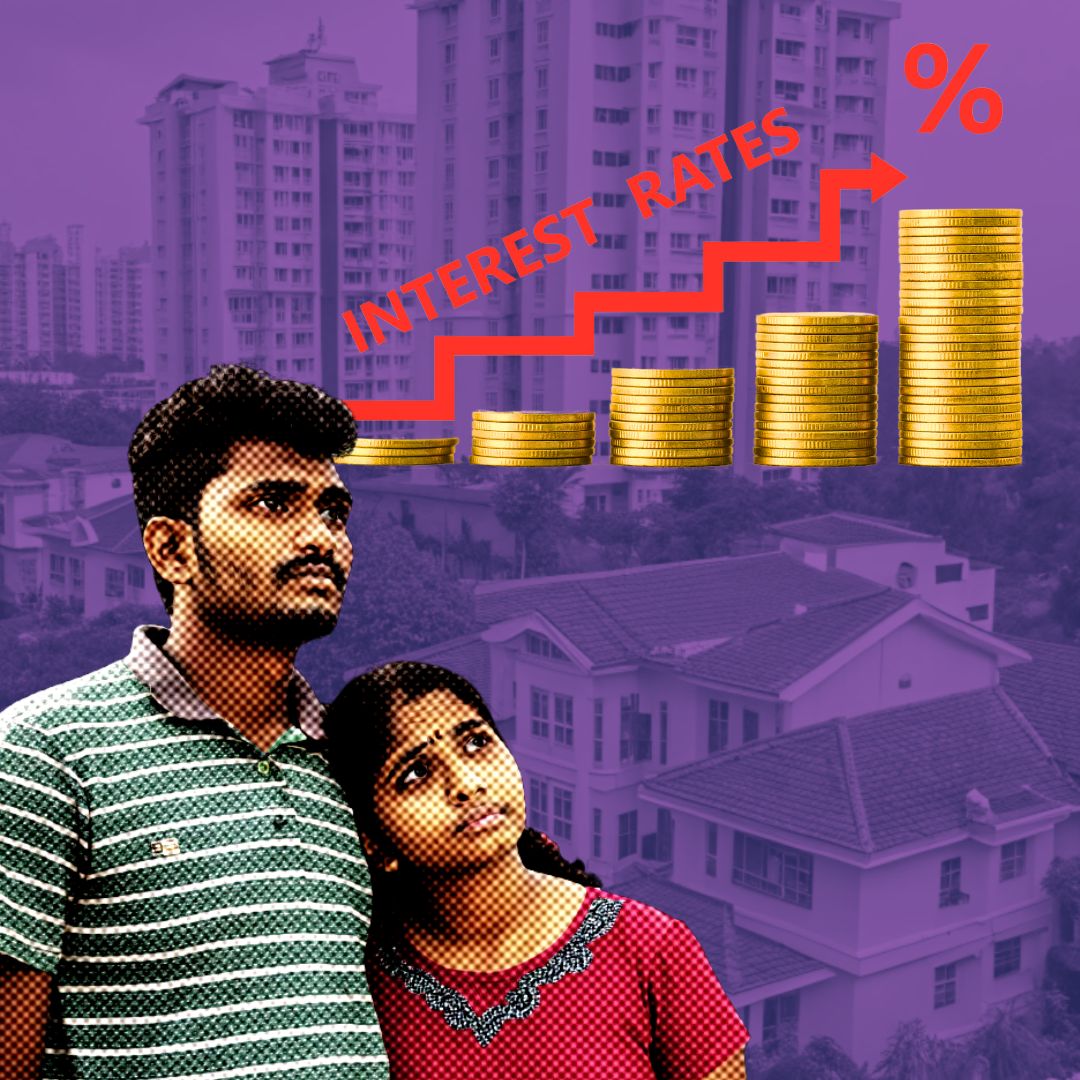As interest rates climb worldwide, the dream of owning a home is increasingly threatened, especially in emerging markets like India. Interest rate hikes are driven by efforts to curb inflation, but they are making mortgage loans more expensive, which is directly affecting affordability for potential homeowners.
In India, homeownership remains the third most important aspiration, as it is often seen as a mark of success and a source of security. However, escalating costs and higher interest rates are pushing that goal further out of reach.
This article explores how rising interest rates influence home affordability, while also shedding light on emerging opportunities that may empower homebuyers to fulfill their dreams.
Global overview of the rising interest rates and impact on home affordability
Global financial markets have been heavily influenced by interest rate hikes. Central banks, including the European Central Bank and the US Federal Reserve, have consistently increased rates over the last two years to counter inflation. This global trend is mirrored in countries like India, where the RBI has also increased rates to contain inflation.
High interest rates increase the cost of borrowing, making monthly mortgage payments considerably more expensive. In the US, for example, mortgage rates surged from below 3% to over 7% in less than two years. This is particularly impactful on young adults and first-time buyers, who now find their purchasing power significantly reduced due to higher home loan costs.
However, in India, we are seeing millennials and Gen Z view property as a viable investment option. For many young buyers, real estate isn’t just about owning a home; it’s about creating a source of income by buying properties to rent. This trend is growing as the rental market strengthens, with many seeing potential returns from rising rental demand, especially in urban centers.
Overview of the Indian scenario
In India, homeownership is culturally significant as it is seen as a source of security and a mark of success. Interest rate hikes have posed unique challenges in this country. The RBI has increased the repo rate several times since early 2022, leading banks to raise lending rates. For instance, mortgage lenders like ICICI and HDFC Bank have raised their home loan interest rates by as much as 50 basis points in recent months. As a result, monthly home loan EMIs have increased, which adds financial pressure on middle- and lower-income groups who aspire to own homes. If you are considering applying for a home loan, you must first check your eligibility for home loan offers and calculate your monthly EMIs before making a decision.
Impact of increasing interest rates:
– Decreased affordability – Reduction in home affordability is a key impact of higher interest rates. As per Livemint, a 1% increase in interest rates decreases a buyer’s affordability by approximately 7.4%. This means that many prospective buyers must either delay purchasing altogether or reduce their property expectations. Additionally, higher interest rates directly impact the loan-to-value ratio and eligibility criteria, making homeownership even harder to attain.
– Stagnant income growth and increased property prices – Despite the challenges presented by rising interest rates, property prices in India have shown resilience, especially in cities like Delhi, Mumbai, and Bengaluru. Surveys indicate that property prices in these metropolitan cities are expected to increase. This price rice, along with higher interest rates, places significant strain on the home affordability index for Indian buyers. This issue is further compounded due to the lack of proportional wage growth.
However, there’s also a glimmer of hope for potential homeowners as RBI has kept the repo rate unchanged at 6.5%. The RBI governor in his monetary policy statement has said that domestic growth has sustained its momentum and world trade is showing signs of improvement. Also, the unchanged repo rate means predictable EMIs, especially for home loan borrowers with floating interest rates.
The growing rental market and income opportunities
Many young Indians today view renting as a practical choice, especially in cities with high real estate costs. Renting offers flexibility, but it also drives an interesting trend: property investment to generate rental income. Many millennials and Gen Z buyers see real estate as a stable investment with the potential to generate passive income. As a result, even with rising interest rates, some buyers are choosing to invest in properties specifically to rent, thereby generating income that can help offset mortgage costs and build wealth.
This shift has potential long-term implications for the real estate market, with developers increasingly catering to the rental segment. Government-backed affordable housing initiatives also play a significant role in accommodating this shift, reinforcing the growing demand for residential properties with rental potential.
Government interventions and developer strategies to tackle affordability issues
The developers and the Indian government are actively exploring ways to alleviate the burden of interest rate hikes on prospective homeowners. For example, national and state governments are employing various incentives and subsidy schemes for first-time homebuyers, such as PMAY (Pradhan Mantri Awas Yojana).
Furthermore, several property developers are offering flexible payment options, such as interest-free EMIs and extended payment terms, to attract buyers who might otherwise be priced out of the market.
However, rising interest rates may reduce the effectiveness of such subsidies, especially if lending rates continue to outpace these benefits.
What does the future hold? Are interest rates likely to decline?
While current economic forecasts suggest high rates may persist in the short term, a gradual reduction could be possible if inflationary pressures ease. The RBI’s current decision to maintain the repo rate shows a balanced approach, and if inflation subsides, this could open doors for rate reductions, directly benefiting the real estate market and affordability.
For potential homeowners in India, lower interest rates would mean improved loan eligibility, reduced EMIs, and better affordability—key factors that could ease their path to homeownership.
Strategies for aspiring homeowners
For aspiring homeowners, it is essential to adopt a proactive approach to financial planning. Building a substantial down payment, exploring flexible loan options, and researching government assistance programs can help mitigate the impact of high-interest rates. Financial advisors also recommend buyers consider fixed-rate mortgages, which provide stability amid volatile interest rates.
Summing up
Despite rising interest rates and the challenges they bring, the dream of homeownership in India remains within reach. As the market adapts to these financial realities, hopeful homeowners can balance aspirations with planning. With the recent stability in repo rates and the potential for future rate reductions, there’s optimism that the journey toward owning a home, however gradual, is still achievable for determined buyers.












